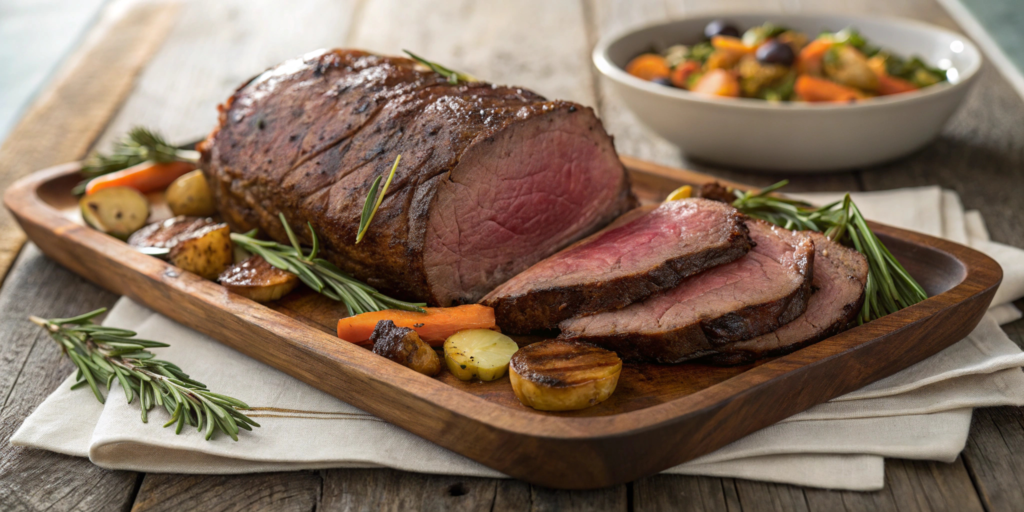Is Venison Healthy? A Comprehensive Guide to Deer Meat Nutrition and Benefits

In the vast world of protein sources, venison stands out as a fascinating and often misunderstood meat. Have you ever wondered, “Is venison healthy?” Well, buckle up for a mouth-watering journey through the nutritional landscape of deer meat! This comprehensive guide will dive deep into every nook and cranny of venison’s health profile, breaking down its nutritional secrets, exploring its potential benefits, and addressing common misconceptions.
From hunters’ tables to gourmet restaurants, venison has been quietly making waves in the culinary and nutrition world. We’ll explore everything from its impressive nutrient lineup to its role in various diets, unraveling the mysteries of this lean, protein-packed meat. Whether you’re a health enthusiast, a curious foodie, or someone looking to diversify your protein intake, this article promises to shed light on why venison might just be the unsung hero of healthy eating.
Understanding Venison: An Introduction to Deer Meat
What is Venison? Defining the Meat:
Hold onto your forks! Venison isn’t just another meat – it’s a culinary adventure waiting to happen. Simply put, venison refers to the meat from deer, typically harvested from wild or farm-raised animals. Unlike your typical grocery store staples, this lean protein packs a serious nutritional punch that’ll make your taste buds and your body do a happy dance.
Origins and Cultural Significance of Venison Consumption:
Talk about a meat with history! Venison has been a staple for indigenous cultures and hunting communities for thousands of years. Native American tribes, European settlers, and countless rural communities have relied on deer meat as a crucial source of sustenance. Imagine the countless generations who’ve warmed themselves around campfires, sharing stories over a hearty venison stew – now that’s some serious food heritage!
Types of Venison: Wild vs. Farm-Raised Deer Meat
Not all venison is created equal, folks! You’ve got two primary types that’ll make a difference in your culinary and nutritional experience:
- Wild Venison: Harvested from free-roaming deer, this type boasts a more robust flavor and typically contains less fat. These deer munch on natural diets of grass, herbs, and forest vegetation, resulting in a more complex taste profile.
- Farm-Raised Venison: Controlled environment deer that often have a more consistent diet and meat texture. While slightly milder in flavor, these still offer an impressive nutritional package.
Each type brings its own unique characteristics to the table, quite literally! Whether you’re a wild game enthusiast or prefer a more controlled meat source, venison has something exciting to offer.
Curious about how this fascinating meat stacks up nutritionally? Hang tight – we’re just getting started on our venison health exploration!
Nutritional Profile of Venison
Is Venison a Nutritionally Dense Protein?
When it comes to is venison healthy, the nutritional profile speaks volumes! This lean meat is a powerhouse of essential nutrients that’ll make your body sing with joy. Moreover, venison stands out as a protein source that’s not just filling, but incredibly nutritious.
Macronutrient Breakdown of Venison
Let’s break down the macronutrient magic. A typical 3-ounce serving of venison packs quite a punch:
- Protein: Approximately 26 grams
- Fat: Remarkably low at just 3 grams
- Calories: Around 130 calories
Micronutrients Found in Venison Meat
Venison isn’t just about protein – it’s a treasure trove of vital micronutrients. Here’s what makes this meat a nutritional superhero:
- Vitamin B12: Crucial for nerve function and blood cell formation
- Iron: Supports oxygen transportation throughout the body
- Zinc: Boosts immune system and supports metabolism
- Selenium: Powerful antioxidant that protects cellular health
Comparative Nutrition: Venison vs. Other Meats
When wondering is venison healthy, a quick comparison tells the story. Unlike beef or pork, venison offers:
Health Benefits of Consuming Venison
- Lower fat content
- Higher protein concentration
- More nutrient-dense profile
- Fewer calories per serving
Learn how to perfectly cook venison with our roast recipe guide for delicious and nutritious meals.
Is Venison Healthy for Weight Management?
Absolutely! Venison could be your secret weapon in maintaining a healthy weight. With its incredibly low-fat content and high protein, this meat helps you feel full longer while providing minimal calories. Furthermore, the lean protein supports muscle maintenance during weight loss efforts.
Explore more on the nutritional benefits of venison to understand its unique health advantages.
Venison and Muscle Building
Bodybuilders and fitness enthusiasts, take note! Venison delivers a serious protein punch that supports muscle growth and recovery. The amino acid profile is nearly perfect for supporting lean muscle development, making it an excellent protein source for athletes and active individuals.
Cardiovascular Health and Venison
Contrary to popular belief about red meats, venison can be a heart-friendly option. The low saturated fat content and high omega-3 fatty acids contribute to:
- Reduced inflammation
- Improved cholesterol levels
- Better heart health markers
Potential Anti-Inflammatory Properties
Beyond basic nutrition, venison offers some impressive anti-inflammatory benefits. The combination of lean protein and essential nutrients helps combat oxidative stress and supports overall cellular health.
Venison’s Role in a Balanced Diet
Integrating venison into a balanced diet can provide numerous health advantages. However, moderation is key. Nutritionists recommend:
- Consuming 2-3 servings per week
- Pairing with diverse vegetables
- Maintaining portion control
By incorporating venison strategically, you’re not just eating meat – you’re making a nutritious investment in your overall health.
Potential Health Considerations
Is Venison Healthy? Examining Potential Risks
While venison boasts numerous health benefits, it’s crucial to understand potential health considerations. Moreover, being informed helps you make the best dietary choices. Despite its lean profile, venison isn’t a one-size-fits-all miracle meat.
Cholesterol and Fat Content in Venison
Surprisingly, venison contains relatively low cholesterol compared to other red meats. Typically, a 3-ounce serving contains:
- Cholesterol: Approximately 95 milligrams
- Saturated Fat: Around 3 grams
Concerns About Wild Game Meat
Wild venison comes with unique considerations. Hunters and consumers should be aware of:
- Potential environmental contaminants
- Risk of parasites or diseases
- Importance of proper field dressing and meat handling
Potential Risks and Precautions
Although is venison healthy remains a resounding yes for most people, certain groups should exercise caution:
- Individuals with specific meat allergies
- Those with compromised immune systems
- People with rare metabolic conditions
Cooking Methods and Health Implications
The preparation method dramatically impacts venison’s health profile. Recommended approaches include:
- Avoiding excessive charring
- Using minimal added fats
- Cooking to appropriate internal temperatures
- Incorporating herbs and spices for additional health benefits
To truly savor venison’s lean and rich flavor, check out our detailed guide to cooking a perfect venison roast and elevate your culinary skills.
Venison in Special Diets
for Low-Carb and Keto Diets
Without a doubt, indeed, venison emerges as a superstar in low-carb nutritional strategies. To begin with, consequently, it contains zero carbohydrates, which, moreover, makes it a standout option for those prioritizing low-carb meals. Additionally, meanwhile, its high protein content perfectly aligns with ketogenic and low-carb dietary principles. Furthermore, in fact, its naturally lean composition absolutely plays a crucial role in supporting metabolic flexibility. On top of that, ultimately, venison is rich in essential nutrients, which, therefore, further enhances its appeal as a healthy and versatile protein source.
Paleo and Whole30 Dietary Considerations
For those embracing ancestral eating patterns, venison represents an ideal protein source. It mirrors the hunting traditions of our predecessors, offering:
- Minimally processed nutrition
- High-quality protein
- Nutrient-dense profile
Gluten-Free and Allergy-Friendly Aspects
Individuals with dietary restrictions, rejoice! Is venison healthy for those with specific dietary needs? Absolutely! Venison provides:
- 100% gluten-free protein
- Hypoallergenic compared to other meats
- Alternative for those with chicken or beef sensitivities
Venison for Athletes and High-Protein Diets
Athletes and fitness enthusiasts find venison particularly appealing. Its nutritional breakdown supports:
- Muscle recovery
- Lean muscle development
- Sustained energy release
- Minimal inflammatory response
Pro tip: For more delicious and nutritious recipes featuring venison, check out our comprehensive recipe collection that explores innovative ways to incorporate this remarkable meat into your diet!
How to Incorporate Venison into Your Diet
Selecting Quality Venison
When exploring is venison healthy, choosing high-quality meat becomes paramount. Moreover, selecting the right cut can make all the difference in your culinary and nutritional experience. Look for venison that appears:
- Deep red in color
- Firm to the touch
- Free from excessive moisture
- Sourced from reputable hunters or farms
Preparation and Cooking Techniques
Venison requires a bit more finesse compared to traditional meats. Because of its lean nature, overcooking can quickly transform this delectable protein into a tough, dry disappointment. Key tips include:
- Marinating before cooking
- Using low to medium heat
- Adding a touch of fat to prevent drying
- Cooking to medium-rare for optimal tenderness
Recipe Ideas and Meal Planning
Is venison healthy for everyday meals? Absolutely! Consider these versatile preparation methods:
- Venison stews and hearty soups
- Grilled venison steaks
- Ground venison in tacos or meatballs
- Slow-cooker venison roasts
- Venison jerky for quick protein snacks
Portion Control and Serving Recommendations
Moderation is key when incorporating venison into your diet. Nutritionists typically recommend:
- 3-4 ounce servings
- 2-3 times per week
- Paired with plenty of vegetables
- Balanced with other protein sources
Sustainability and Ethical Considerations
Environmental Impact of Venison Consumption
Venison offers more than just nutritional benefits. Surprisingly, wild deer meat can be a more sustainable protein source compared to traditional livestock. Through responsible hunting, populations can be managed while providing:
- Natural population control
- Reduced agricultural land use
- Lower carbon footprint
- Preservation of ecosystem balance
Hunting and Sustainable Meat Sourcing
Ethical hunting practices ensure that venison consumption supports both environmental and wildlife management goals. Responsible hunters contribute to:
- Preventing deer overpopulation
- Maintaining ecological equilibrium
- Supporting local conservation efforts
Ethical Considerations of Deer Meat Consumption
While is venison healthy remains a resounding yes, ethical considerations matter. Consumers should:
- Support local and responsible hunting practices
- Choose meat from regulated sources
- Understand the ecological role of hunting
- Respect wildlife management principles
FAQs : Frequently Asked Questions About Venison
Is Venison Healthier Than Beef?
Venison typically offers a healthier alternative to beef. Compared to traditional beef, it contains:
- Lower fat content
- Fewer calories
- Higher protein concentration
- More diverse micronutrients
How Often Can I Eat Venison?
Nutritionists generally recommend:
- 2-3 servings per week
- 3-4 ounce portions
- Balanced with other protein sources
- Varied diet integration
Is Venison Safe for People with Specific Health Conditions?
While is venison healthy for most individuals, those with specific conditions should consult healthcare professionals. Considerations include:
- Low-fat dietary requirements
- Protein metabolism issues
- Individual nutritional needs
- Potential meat allergies
What Are the Best Cuts of Venison?
Top venison cuts include:
- Backstrap (most tender)
- Tenderloin
- Shoulder roast
- Hindquarter steaks
- Ground venison
How Does Venison Compare Nutritionally to Other Game Meats?
Venison stands out among game meats with:
- Highest protein concentration
- Lowest fat content
- Rich micronutrient profile
- Superior digestibility
Conclusion: Embracing Venison as a Nutritional Powerhouse
Is venison healthy? The evidence overwhelmingly suggests yes! From its impressive nutritional profile to its sustainable sourcing, venison represents more than just a delicious meat – it’s a holistic food choice that supports personal health and environmental balance.
By understanding its nuanced benefits, preparation techniques, and ethical considerations, consumers can confidently incorporate venison into a balanced, nutritious diet. Whether you’re a fitness enthusiast, health-conscious individual, or culinary adventurer, venison offers a unique and valuable protein source that goes beyond traditional meat options.
Remember, the key lies in moderation, quality sourcing, and informed consumption. As with any dietary choice, individual needs vary, so consult nutrition professionals to determine the best approach for your specific health goals.
Embrace the lean, nutrient-dense world of venison – your body and taste buds will thank you!
